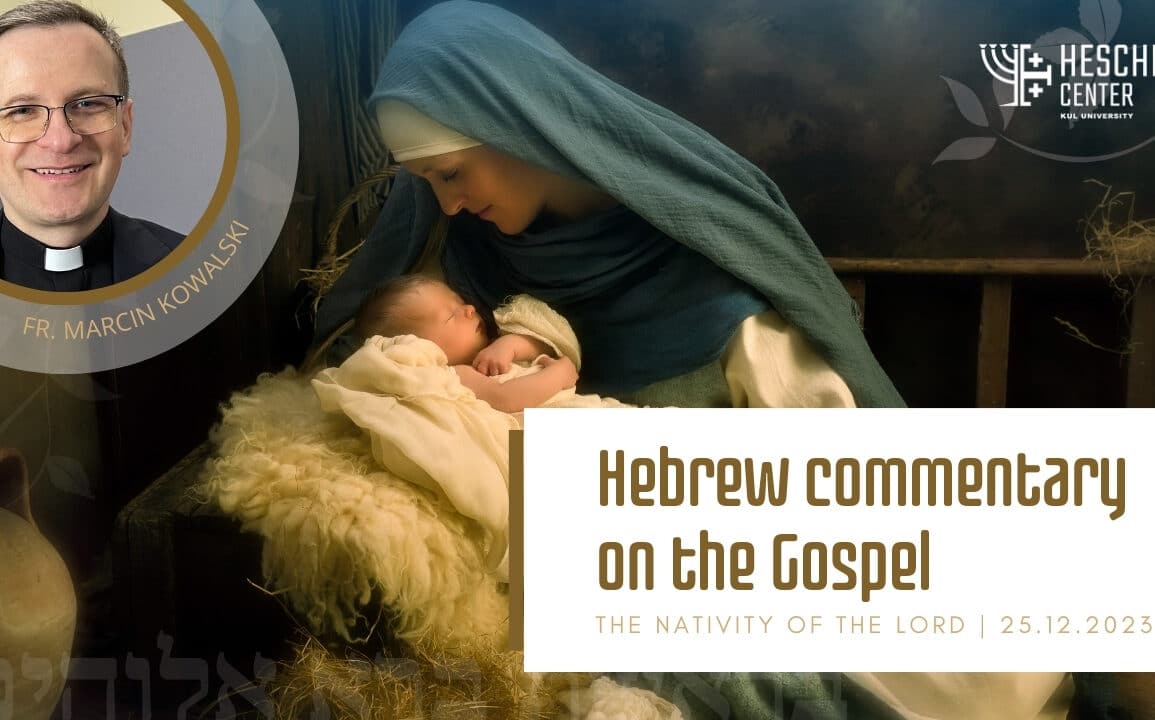The Nativity of the Lord, Christmas, is the most joyous and amazing miracle, a celebration of the Incarnation of God’s Son. The celebration shows both the continuity and novelty that Christ brings to the history of salvation written in the Old Testament – writes in his commentary Director of the Abraham Joshua Heschel Center for Catholic-Jewish Relations at the Catholic University of Lublin, a Bible scholar Fr. Prof. Marcin Kowalski.
In the famous prologue of the Gospel according to John read on the feast of the Nativity of the Lord there are many references to the Old Testament. The very first verse, “in the beginning was the Word” (en arche en ho logos, Jn 1:1), is a clear referent to the first verse of the Book of Genesis and the entire Bible: “In the beginning God created” (bereshit bara Elohim, Gen 1:1). “The Word that John refers to has existed from the beginning, which means here an absolute beginning, the origin and principle of all things” – explains Fr. Marcin Kowalski and adds that “Similarly, God’s Wisdom in the Book of Proverbs speaks of herself as set up at the first, before the beginning of the earth”.
The Word described by John is a very important term in Jewish tradition, an expression of God’s creative power, often cited by the prophets. The Divine Word conveys a light that dispels the darkness of the world. “The Word in John enters as light into the world full of darkness, which again is a reference to the creation account (Gen 1:4-5) and to the Old Testament texts, which often feature an opposition between light, which stands for God and his Word, and darkness, which stands for evil and misfortune” – stresses Director of the Heschel Centre.
Fr. Kowalski notes that “The Word according to John is rejected by his own people, which also echoes the drama of the prophetic Word being rejected by Israel”. Nevertheless, the Word has dwelt among us, or rather “pitched his tent among us” (Greek skenoo). “In a similar way, the Book of Exodus describes God accompanying Israel in the Tent of Meeting as they wandered through the desert, and Ben Sirah speaks of Wisdom pitching her tent in Israel” (Sir 24:8).
The Word, which is the Son, not only continues God’s work of creation, but marks the beginning of what Paul calls a “new creation” (2 Cor 5:17), bringing our human world out of the night of evil and sin. Most importantly, “The Word described by John is not simply an extension of God’s work or an embodiment of God’s Wisdom. It is God incarnate in man” – observes Fr. Kowalski. “This truth of faith, so crucial for Christians, is at the same time very difficult to accept for our Jewish brothers and sisters of their high, pure notion of the divine transcendence” – adds the commentator.
God incarnate in Christ is the absolute novelty of the history of salvation, the acme of God’s desire to be close to human beings. “God becomes one of us, to share to the end the misery, the drama, but also the beauty and joy of human life, to redeem it. The Son comes as similar to us, and at the same time so different from us. At the same time, He does not jealously guard his sonship and does not keep it only for himself. In Him, we all become daughters and sons of God, adopted children of God and heirs to His glory” – sums up Fr. Marcin Kowalski.
The full text of the commentary can be found at the website of the Heschel Centre at the Catholic University of Lublin










